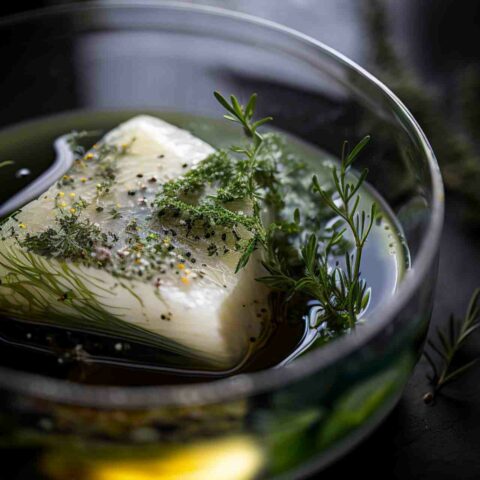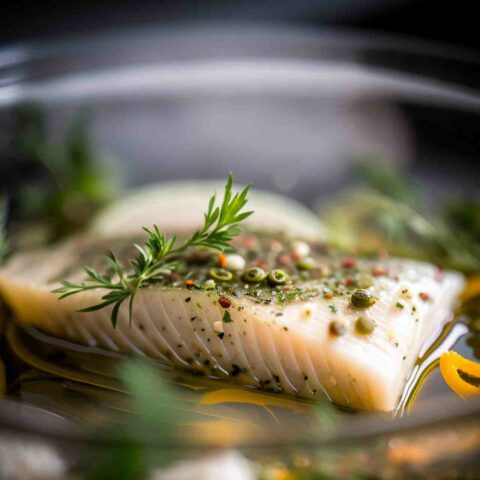Fish is an excellent source of protein, but it can also get dry after being cooked. Marinating helps retain moisture and flavor.
But Can You Keep the Marinated Fish for 24 Hours in The Fridge?
The answer is yes! Fish should really only be marinated in the fridge (for food safety reasons), not at room temperature.
The flavor of the fish will be altered by marinating it too long, especially if it is marinated for more than 8 hours.
How Long Can Marinated Fish Stay in the Fridge?
Do not leave seafood in a marinade for too long. A 24-hour period is already enough to keep it marinated in the fridge. Because they are typically smaller in size as well as thinner when compared to marinated meat, they are often marinated easily.
Grilling or pan-frying fish fillets or any other type of seafood for a big group or party consider marinating it beforehand. Marinating seafood is an excellent way to enhance its flavor and keep it moist and tender, whether you’re cooking over high heat or using another method.
A high-quality marinade not only adds a delicious taste to your seafood, but it also helps to maintain its texture. The moisture in the marinade creates a protective layer around the seafood, preventing it from drying (just like marinade and chicken) out during the cooking process. Additionally, the oil coating in the marinade makes it less likely for your seafood to stick to the grill or pan.

Overall, marinating your seafood is a simple and effective way to take your cooking for a crowd to the next level.
A Handy Table Of Seafood and Fish Marination Times
| Time To Marinate in The Fridge | |
| Shrimp | 20 Minutes |
| Large Shrimp – Lobster Tails | 30-60 Minutes |
| Flakey Fish | 20-30 minutes |
| Thin Fillet Fish | 20-30 minutes |
| Firm Fish – Halibut | 30-60 minutes |
| Steak Cut Fish – e.g Tuna | 1 to 2 hours |
How Long to Marinate Fish or Seafood
As a general guideline, the longer you marinate fish or seafood, the better the flavor. But keep in mind that leaving fish or seafood to marinate for too long can cause it to become tough and dry.
When marinating fish or seafood, start with a time estimate of 20 minutes per pound but no more than 1 hour per pound unless it is a tuna or marlin steak. If you soak your fish in an acidic marinade for too long it can actually overcook it and make it really mushy.
With some experimentation, you’ll find out exactly how long is best when you want to add amazing flavor and texture to your dishes. Don’t be afraid to give different ingredients more or less time in the marinade depending on how quickly they cook—it makes all the difference.
Always remember the golden rule: marinate at most 1 hour per pound of fish and no less than 20 minutes!
There are several ways to use marinated raw fish, from simple steaming to complex recipes.
But Can You Keep the Marinated Fish for 24 Hours in The Fridge?
Yes, it’s usually okay to store marinated fish in the fridge for up to 24 hours. However, it’s important to note that marinade can start to break down proteins due to the acidic components of the marinade.
This process is sped up with prolonged exposure to the acid, meaning that after about 24 hours you start to lose the quality of your fish and not get as much flavor.
For best results, if you plan on keeping your fish marinating for over 24 hours, be sure to reduce or eliminate the acid from your marinade so that it doesn’t spoil your fish!
How Long Can Marinated Fish Stay in the Fridge?
Whenever you marinate your fish, knowing how long you can safely store it in the fridge is important. Generally speaking, fish that has been marinated should not stay in the refrigerator for any longer than two days.
Can I marinate the fish and keep it in the fridge? – yes this is the correct way to apply the marinade. But make sure it is in an airtight container. Putting marinated fish into “cool store” does slow down the marinating process.

But remember when cooking fish fresh fish is best, you don’t need to worry about keeping it in the refrigerator for too long – just marinate it and cook it as per our table below.
Fresh fish, shrimp, scallops, and squid should be refrigerated for one to two days only else the freshness disappears and they do not taste as good, plus the “fishiness” aroma begins to arrive.
Why Marinate Fish?
Marinating fish is a great way to add flavor, tenderize, and provide moisture to the fish. Marinating not only adds flavor but it can also help the fish stay juicy when cooked.
When you marinate fish it helps lock in moisture so your fillets don’t dry out during the cooking process. You can also customize your marinade with fruits, vegetables, or any number of different flavors depending on what type of dish you are creating.

Benefits of Marinating Fish
Marinating fish is a culinary method used to enhance the flavor, texture, and nutritional value of seafood dishes. Here are the top five benefits of marinating fish:
- Improved flavor: Marinating fish can help to infuse it with delicious flavors, such as herbs, spices, and citrus juices. This can make the fish more flavorful a good example of this is our recipe for fish en papaiet.
- Increased tenderness: Marinating fish can help to break down tough fibers in the fish meat (e.g tuna steaks), making it more tender and easier to eat.
- Healthier meals: Marinating fish can also make your meals healthier, as you can use marinades that are low in fat and calories, and high in vitamins and nutrients, this you get an additional benefit.
- Versatility: Marinating fish is a versatile technique that can be used with a wide variety of fish types, such as salmon, tuna, cod, and more. Plus it is helpful when preparing fish in advance for a party and it prevents it from drying out.
- Convenience: Marinating fish can also be a convenient way to prepare meals in advance, as you can marinate fish in the fridge and then simply cook it when you are ready to eat.
How to Choose a Marinade for Fish
Choosing the best marinade for your fish dish is essential. By selecting ingredients that pair well with the fish, you can elevate the flavor and make it more delicious!
When deciding what kind of marinade to use, there are a few key ingredients to consider. First, pick an acidic ingredient like lemon juice or vinegar to keep your fish soft and moist. Second, add some salt so it seasons not just on the surface but throughout the entire fillet. Third, don’t forget some herbs and spices to give it a boost in flavor, like garlic powder and cumin.
Finally, choose an oil that will help hold all of these flavors together. Olive oil is typically used, but you can also experiment with different alternatives like sesame oil or rice bran oil.
The Basics of Marinating Fish
The basics of marinating include two simple steps. First, choose a marinade that suits the type of fish you are cooking and secondly, allow enough time for the fish to absorb the flavors from the marinade.
Every different type of fish will require its own unique flavoring. For example, light-fleshed fish like whitefish or tilapia tend to be quite delicate, so you’ll want to pick a sweet or mild marinade.
On the other hand, oily fish like salmon or mackerel should have bolder flavors such as garlic or teriyaki sauce. These strong marinades help counteract their large fat content while enhancing their flavor in impressive ways!
Here a The Five Basic Steps to Marinating a Fish
- Choose your marinade: Select a marinade that complements the flavor of the fish. Common marinade ingredients for fish include lemon juice, olive oil, garlic, ginger, and herbs like parsley, cilantro, or dill.
- Prep the fish: Rinse the fish under cold water and pat it dry with paper towels. If necessary, remove any bones or skin from the fish.
- Place the fish in a dish: Place the fish in a shallow dish or plastic bag that is large enough to hold it comfortably.
- Add the marinade: Pour the marinade over the fish, making sure it is evenly coated. If using a plastic bag, seal it and gently massage the fish to distribute the marinade.
- Marinate the fish: Cover the dish with plastic wrap or seal the bag and refrigerate the fish for at least 30 minutes. See our fish marinating table for exact times, depending on the type or thickness.
The Two Most Popular Methods Of Marinating Fish and Seafood
The two most popular methods of marinating fish and seafood are using a Plaastic Bag or a Plate/Bowl with an airtight cover or cling wrap.
With A Ziplock Bag
Marinating fish in a plastic bag can be a convenient and effective way to infuse it with flavor.
Step 1: Put in The Mixture
Place the pre-made marinade into the plastic bag – enough to cover all the fish.
Step 2: Pat It Dry
The key to making the marinade stick during Step 2 is to make sure the fish is completely dry. This step involves patting the fish down with paper towels to get rid of excess moisture.
Using paper towels instead of a cloth will ensure that no oils are left on your fish that may interfere with the marinade’s flavor. After you pat it dry, leave your fish out to air-dry for a few minutes before moving onto the next step.
Once the fish is adequately dry, this will give your marinade an opportunity to really penetrate and flavor the fish. The more moisture you can get rid of, the better your finished product will be! Plus, you don’t want wet spots on the grill where it won’t cook evenly either.
Step 3: Place The Fish Inside
Now place the fish inside the bag with your marinade. Make sure that the fish is completely submerged in the marinade.
Step 4: Zip or Close The Bag
Step 4 is all about sealing your fish in the marinade. To do this, you need to zip or close the bag. This helps to keep the marinade and fish together and makes sure it doesn’t leak out.
It’s important to select a quality plastic bag that can be properly sealed shut. Some bags have a zipper closure while others have a tie or snap closure. Pick one that works best for your fish.
Make sure the bag is well-sealed after filling with the marinade and fish of your choice. You don’t want any leaks when you place it into the refrigerator! It is best practice to put the bag on a plate inside the fridge
Also, make sure to get as much air out of the bag as possible before closing it shut.
Step 5: Refrigerate For The Correct Time
Step 5 of marinating fish is simple: chill it in the refrigerator for the amount of time you chose and specified earlier. Refrigerating your marinating fish is essential to allow the flavors and ingredients in the marinade to properly infuse with the fish.
Time matters when marinating and different types of fish require different amounts of time. As a rule, thinner cuts, such as fillets or steaks, only need an hour or two in the refrigerator to soak in all those wonderful flavors. Thicker cuts, such as whole or halves, should soak for around 2-4 hours for ideal results.
Just remember that longer isn’t always better–if you leave it too long in the fridge, certain delicate fishes can get mushy! So, use your best judgment and enjoy all sorts of deliciousness that comes with using a flavorful marinade!
With A Bowl And Food Wrap
If you don’t want to mess with a large container or bag, covering the fish tightly in a bowl with plastic wrap can work. This will keep the flavor of your marinade in contact with the surface of the fish as much as possible.
Step 1: Prepare the Marinade Mixture
Chose the rig mixture for your taste and style of fish
Step 2: Pat Dry
When patting your fish dry, make sure to use paper towels and press firmly but lightly with both hands to ensure that any excess moisture is removed from both surfaces of the fish fillet.
Step 3: Lay The Fish Into The Bowl Or Plate
Be sure that your container is large enough so that all of the pieces of fish are covered by the marinade. Now curl up those edges if needed and spread out those fancy scales!
Step 4: Cover With Food Wrap And Store In The Refrigerator
Once your fish is ready to go, be sure to cover it with plastic wrap and set it in the refrigerator. Letting it sit for at least 2 hours allows the flavors from your marinade to blend with whatever type of seafood you have.
Step 5: Turn Over
Step 5 in the marinating process is to turn over. This ensures that all the sides of your fish get equal exposure to the marinade. Make sure when you flip it that your fish doesn’t slip off the plate!
What Affects The Marinating Time For Fish?
When it comes to marinating fish, the time needed depends on several factors. Firstly, it depends on the type of fish you are using.
Another factor to consider when marinating fish is the strength of the marinade used. For instance, an acidic marinade such as one containing lemon juice will work faster than one with a higher fat content.
Finally, the thickness of the piece of fish and whether it has been skinned or not will affect your required marinating time too- thicker pieces require longer to take up all the flavors!
Filet’s Size
Generally speaking, thinner fillets such as flounder and sole will take less time to achieve optimal flavor than thicker fillets such as salmon and swordfish. When in doubt, err on the side of caution – longer marination times can cause the flavor to become too intense.
Texture
Texture is key when it comes to marinating fish! You need enough time for the marinade ingredients to penetrate the meat, but not so much time that your fish turns into mush.
The texture of your finished product largely depends on how long you allow it to marinate. Depending on the size, thickness, and type of fish you are using, it could take anywhere from 15 minutes to two hours.
Acidic Content
When marinating fish, the acidic content definitely matters. That’s because acid in a marinade will break down proteins and tenderize the meat.

The most common acids used for marinating fish are concentrated citrus juices like lemon, lime or grapefruit. Vinegar, wine and yogurt are also great options that add an extra flavor dimension to your dish.
In general, it takes around 30 minutes or longer for a marinade with an acid content to work its magic on your fish. However, if you want to play it safe you can always marinate for 1 to 2 hours in refrigerator.
Always keep a watchful eye when using highly acidic ingredients because they have a tendency to overcook the protein which can result in rubbery texture.
Top 5 Marinade Recipes For Fish
Ginger With Soy Sauce Marinade
Ginger with Soy Sauce marinade is a favorite in Asian cuisine. It’s believed to balance flavors and bring out the fish’s natural sweetness.
You can use this marinade for most types of white fish including Tilapia, Cod, and Halibut.
Herbs, Olive Oil Plus Lemon or Lime Juice Marinade
Herbs, olive oil, plus lemon or lime juice marinade is a classic and simple marinade great to use when cooking fish. All you need is herbs such as oregano, basil, thyme (or any mix of spices and herbs that you prefer), olive oil and freshly squeezed lemon or lime juice.
This marinade works best in mild flavored fish such as cod, sea bass, halibut and haddock. The best part is that the marinating process takes only 15 minutes which makes this a quick and easy meal to whip up!
Lime and Coconut Marinade
Lime and coconut marinade is a delicious combination that will make your fish dishes zesty and flavorful. You only need to marinate the fish in this mixture for one hour before cooking.
The marinade combines freshly squeezed lime juice with milk, honey, garlic powder and ground coriander. After combining all of the ingredients together, you’ll have an aromatic and flavorful marinade to complement your fish dish.

Teriyaki Marinade
Teriyaki marinade is one of the most popular marinades for fish. The combination of soy sauce, sherry, brown sugar and spices forms a delicious coating that also helps preserve the moisture and flavor of the fish.
Marinating your fish in Teriyaki marinade may only require 30 minutes but it really depends on how thick or thin the cut of fish is. Generally speaking, however, you can expect to marinate fish in teriyaki sauce for approximately 1 hour plus.
Honey Orange and Ginger Marinade
This delicious marinade has a hint of sweetness and smokiness that works great with salmon and other types of fish. Honey Orange & Ginger Marinade is the perfect marinade to make your seafood taste like it was cooked in an authentic restaurant!
The combination of orange juice, honey, garlic and ginger create a sweet-tart flavor which tenderizes the fish for an incredibly succulent dish. This marinade requires about 1 hour to really give your fish that desired zestiness.
How Long Can Marinated Fish Stay in the Fridge?
Generally speaking, it’s best to marinate for no longer than 24 hours before cooking. Any longer and the acidity of the sauce will start to break down the flesh too much.
How Long Can You Marinate Salmon?
The time it takes to marinate a piece of salmon will depend on which type of marinade you’re using and how long you would like your dish to be infused with flavor. For a lighter marinade, 15 minutes is usually enough while more intense marinades such longer periods of up to 6 hours.
If you leave your salmon in the marinade for longer than 24 hours, the acid will begin to fully break down the protein connections that hold the meat together, causing it to dissolve. This will result in a mushy and flabby fish.
Is It Ok to Marinate Fish Overnight?
Many people wonder if it’s ok to marinate fish overnight. The answer is yes, but you have to be careful. Just make sure that the marinade is not too acidic – such as citrus juice or vinegar – because those will cook the fish after just 1 hour if they are in high concentration and alter the texture and flavor of your fish.
Can You Marinate Fish Too Long?
Can you marinate fish too long? The answer depends on the type of fish and how you’re preparing it. If you forget to take out the marinating fish and leave it in for too long, unpleasant tastes can start to develop.
Overall, don’t let your marinating seafood linger in the fridge any longer than necessary as this could lead to an unforeseen taste disaster!
How Long Before Cooking Should You Marinate Fish?
In general, you’ll want to let delicate types of fish (like whitefish) sit in the marinade for between 15-30 minutes while more hearty fish (like salmon or trout) can benefit from an additional 30-60 minutes in the marinade.
Storing and Marinating the Fish Ahead for A Party
When it comes to marinating your fish for a party, you may be wondering how far in advance you can prepare it. The answer is that you can store and marinate your fish up to 24 hours in advance! but make sure the fish sauce or marinade does not contain too much acid.
Conclusion
No matter how long you marinate your fish, the key is to ensure a thorough, safe cook. Marinating can give fish an extra flavorful kick and make it an enjoyable meal. Find the right marinade, follow the time and temperature guidelines, and enjoy that delicious taste of marinated fish!
